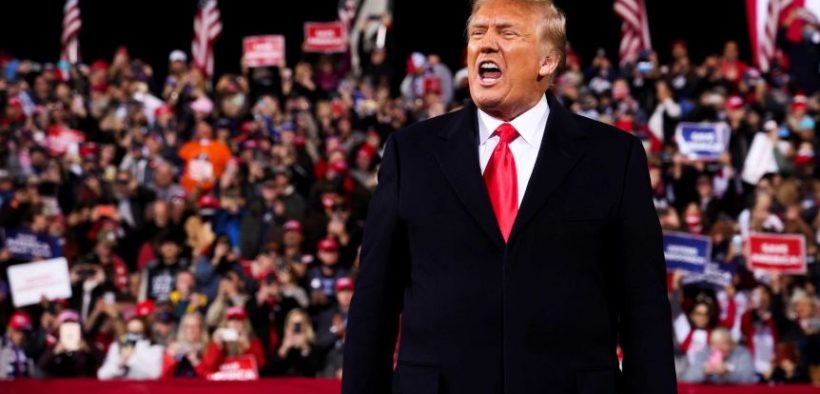What would impeachment mean for US President Donald Trump?

US President Donald Trump could be the first president to be impeached twice.(Reuters: Jonathan Ernst)
Donald Trump’s final days in power are likely to be eventful and historic.
In the wake of Trump supporters rioting at the US Capitol last week, there are calls to remove the President from office.
Should Vice-President Mike Pence not invoke the 25th Amendment to remove Trump from the top job, the Democrats suggest they will try to quickly impeach the Commander-in-Chief.
Why is Trump facing talk of a second impeachment?
Inciting insurrection.
Mr Trump is accused of inciting his supporters to storm the US Capitol as the Congress was counting electoral votes and were preparing to finalise president-elect Joe Biden’s victory.
On Twitter, Mr Trump called the mob “very special” people and he said he loved them.
Five people died, including a Capitol police officer.
House Speaker Nancy Pelosi says Mr Trump needs to be removed from office immediately because of “the danger he still poses”.
“The President’s dangerous and seditious acts necessitate his immediate removal from office,” she says.
She’s been putting pressure on Mr Pence to invoke the 25th Amendment and has signalled the Democrats are working towards a swift impeachment.
The articles of impeachment are expected to be introduced on Monday, with the House to vote as soon as Wednesday.

What does impeachment mean for Trump?
It’s history making.
Trump would become the first US president to be impeached twice but it would mean nothing unless he’s convicted by the Senate.
And, like all things, there’s a process.
First, the House of Representatives needs to vote on the articles of impeachment as it did in 2019 when it formally charged Trump with abuse of power and obstruction of Congress.
The second step is a trial in the Senate where a two-thirds majority — 67 of 100 senators — need to agree to obtain a conviction.
Last time the numbers were in the President’s favour and he was acquitted by the Republican-led Senate.

Brian Kalt, a constitutional law professor at Michigan State University, says impeachment by the House could “conceivably be done in a day or two”.
But he doesn’t think there’s any possibility of finishing a Senate trial before January 20, Inauguration Day, when Mr Biden will be sworn into office.
“They can still continue after he is gone, but it will be harder to justify it at that point,” he says.
There are even some reports the soonest the Senate could begin an impeachment trial would be Inauguration Day.
Professor Kalt says impeachment “won’t mean anything” unless Mr Trump gets convicted.
“If he does get convicted, which seems unlikely at the moment, the Senate could choose to disqualify him from future office,” he says.
Would Trump be able to run for president again?
Without a conviction from the Senate, the short answer is yes.
However, if Trump is convicted, he might be prevented from running again for the presidency or ever holding public office again.
Could he face criminal charges after leaving office?
Yes.
Trump faces a range of legal threats after leaving the White House.
Reports suggest they cover everything from business dealings to possible obstruction of justice.
“While it is difficult — maybe impossible — to prosecute a sitting president, all bets are off once he is gone,” Professor Kalt says.

Is the self-pardon option still on the table?
Online betting agencies seem to think so. They have been shortening their odds for weeks.
Professor Kalt says the option is still in play.
“It is unclear whether he has the power to do it, but it seems likely he will give it a try,” he says.
Trump would be the first president to attempt to self-pardon.

In 2018, Trump said he had the “absolute right” to pardon himself — a suggestion many constitutional scholars dispute.
The pardon power, which comes from the US constitution, is one of the broadest available to a president.
Pardons are typically given to people who have been prosecuted, and can cover conduct that has not yet resulted in legal proceedings.
Trump has already issued many pardons including for Charles Kushner, the father of his son-in-law Jared Kushner, and his former campaign chairman Paul Manafort.
Another option — although unlikely — is for Trump to resign and for his vice-president to give him a pardon.
This strategy was famously used by Richard Nixon in 1974 after the Watergate scandal.
Nixon’s vice-president Gerald Ford became president and used his powers to grant his predecessor a “full, free, and absolute pardon” for all offences he “committed or may have committed or taken part in during the period from January 20, 1969 through August 9, 1974”.










